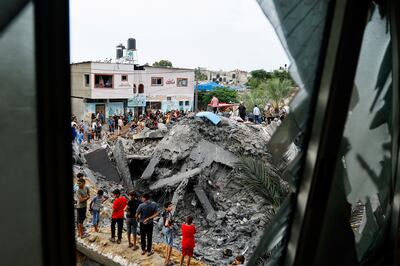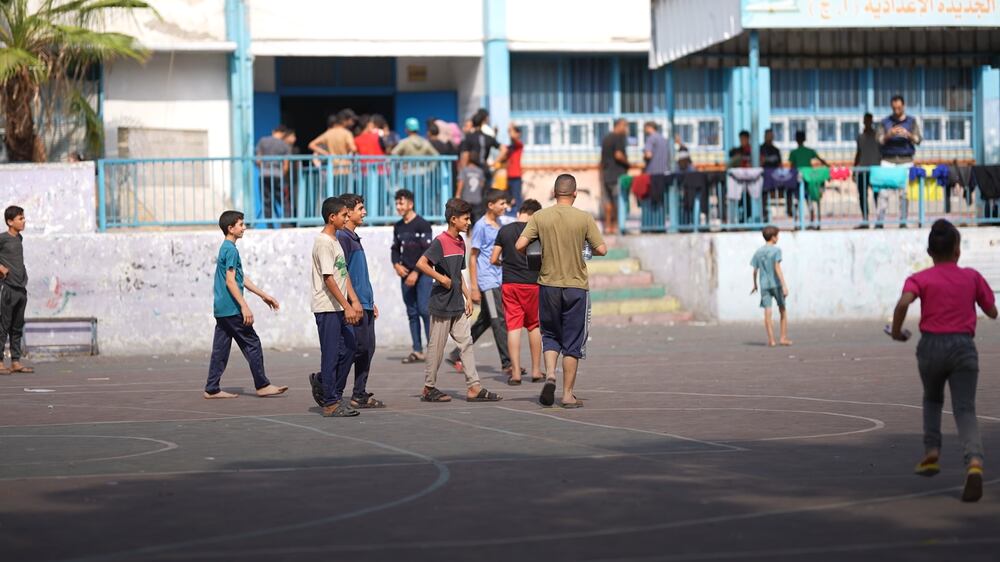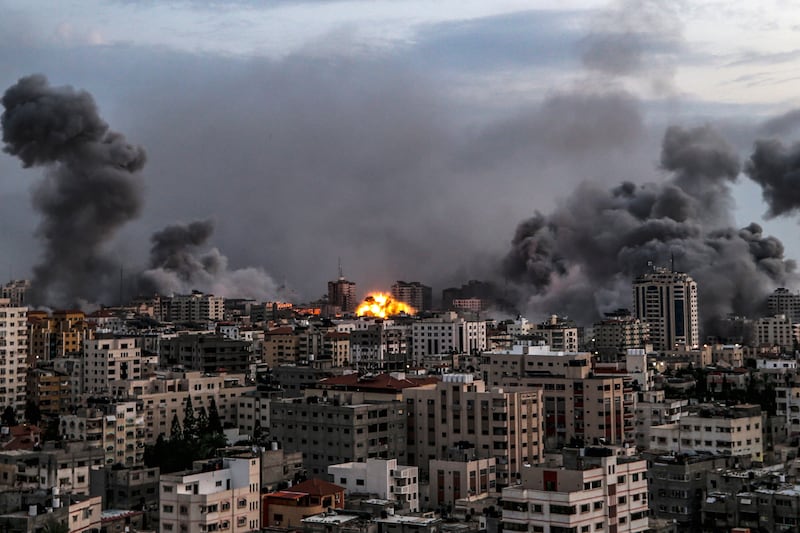Follow the latest updates on the Israel-Gaza violence here
The Hamas attack on Israel took residents of the Gaza Strip by surprise, says Nagham Mohanna, a contributor to The National from the Palestinian enclave.
Her family was on Monday forced to flee their home in the north of Gaza, close to the Israeli border, as Israel continued to launch retaliatory air strikes.
She is currently seeking shelter and described the scene from the moment the latest war between Gaza and Israel began.
"People in Gaza woke up on Saturday morning to the sound of shelling that confused everybody, before we found out what exactly was going on," she said.
A few hours later, the leader of Hamas’s military wing, Mohammed Deif, who is wanted by Israel, announced the group had launched an assault on Israel.
He said the attack was in response to a 16-year blockade of the Gaza Strip, Israeli raids on Palestinian cities in the occupied West Bank, violence at Al Aqsa Mosque and attacks on Palestinians by settlers, as well as the expansion of settlements.
“That’s when we figured out what was happening. Many people were surprised it was Hamas that launched this widespread attack and not vice versa," Mohanna said.
“Some people were thrilled in the beginning, knowing full well that the Israeli response will be brutal and huge.
“People began rushing to stores and bakeries, stocking up on supplies in preparation for what was to come. The queues were huge. People got what they could until the shelves were empty.”
Mohanna lives in a relatively comfortable area in Gaza known as Al Remal.
Her family left their home there to seek refuge elsewhere, after reports on social media that Israel had told residents to evacuate the area before it attacked.
“Now the streets are relatively empty, except for people who are heading outside in search for what little supplies remain” she told The National by phone.
"With the announcement of a total blockade from the Israeli side as well, we’re expecting fuel and electricity to run out completely.
"Now people are relying on simple generators, but we know that it’s a matter of time before even those stop working."
The phone connection was unstable. Attempts to contact Mohanna through messaging app WhatsApp were unreliable after Israel cut off broadband internet services.
The death toll from the attacks on Gaza increased to 687 by Monday night, including 140 children and 105 women, the Palestinian Health Ministry said. At least 3,726 people have been injured.

“Hospitals are unable to cope with the number of deaths and injuries," Mohanna said.
“They have refused to speak to the media or even let us in.
“Yes, the people of Gaza are used to bombardment, war and shelling. But now, the sound of explosions is non-stop, whether it is rockets leaving the Strip or entering it.
“It is all very unfamiliar. This is unlike anything we’ve seen before.”
Food shortages
There is "no plan B", Gaza resident Waseem Al Sisi told The National after he learnt of the plan for a "total siege" of the enclave announced by Israeli Defence Minister Yoav Gallant.
He is sheltering at his grandfather’s house, hoping it might be safer, but he is not optimistic.
On Sunday he was frantic, he said, but on Monday he was coming to terms with the looming food, fuel and electricity shortages.
“We can’t stockpile extra fuel or food. There are no generators to buy, there are no open shops,” he said.
Gazans take refuge in schools

“There was a big one near me. The occupation strikes destroyed it."
Sixty people were killed and 40 suffered "severe injuries", he said.
“I don’t know what to say. It’s hard. We’re just trying to stay calm for the children," Mr Al Sisi said.
"We have been here before, but not at this level of difficulty. There is nothing to do, nothing to say, nothing to plan."
With its economy crippled by a years-long blockade, Gazans have relied on help from the international community, but that too is drying up after the Hamas offensive, which killed at least 900 people in Israel, according to Israeli media.
Austria and Germany have announced they are suspending aid to Palestinians in response to the attacks. EU countries comprise the largest donor bloc to Palestinians.






